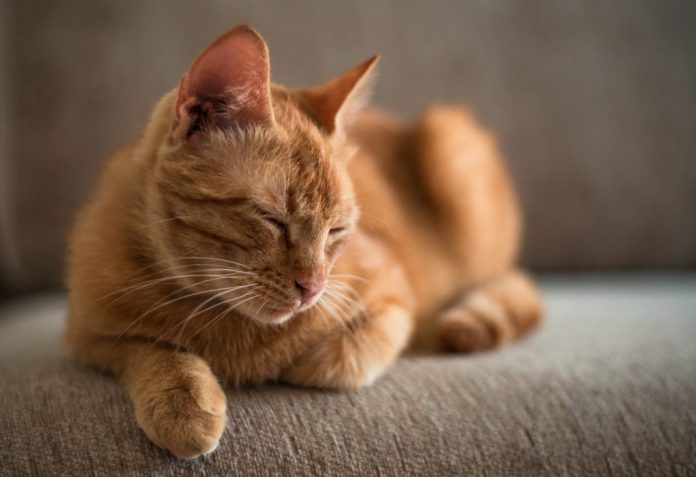Domestic cats and other felids rub their faces and heads against catnip (Nepeta cataria) and silver vine (Actinidia polygama) and roll on the ground as a characteristic response. In a new study published in the journal Science Advances, a team of researchers from Japan and the UK found that this behavior transfers nepetalactone and nepetalactol — two bioactive iridoid compounds found in catnip and silver vine, respectively — onto the faces and heads of the cats where they repel mosquitoes.
Catnip and silver vine are known to hold a special place in felines’ hearts.
When cats encounter these plants, they rub their heads and faces against them and roll around on the ground, displaying undeniable enjoyment. Afterward, the cats lounge around in a state of intoxicated repose.
But while pet owners around the world gift their cats toys laced with catnip or silver vine leaves, the biological significance of these plants and the neurophysiological mechanism triggered when cats sniff and rub against them has not been known.
“The first appearance of silver vine as a cat attractant in literature in Japan dates back to more than 300 years ago,” said Professor Masao Miyazaki, a researcher in the Department of Biological Chemistry and Food Sciences at Iwate University.
“A folklore Ukiyo-e drawn in 1859 shows a group of mice trying to tempt some cats with a smell of silver vine. Still, benefits of the cats’ response had remained unknown.”
To investigate, Professor Miyazaki and colleagues tested how 25 laboratory cats, 30 feral cats, and several captive big cats, including an Amur leopard, two jaguars, and two Eurasian lynx, responded to filter paper impregnated with nepetalactol.
In contrast, dogs and lab mice showed no interest in the nepetalactol-containing papers.
Next, the researchers compared how 12 of the cats responded to each of the known bioactive iridoids, finding that nepetalactol is the most potent compound in silver vine leaves.
To test whether feline responses to nepetalactol are regulated by the opioid system, they examined changes in plasma levels of β-endorphin 5 min before and 5 min after 5 cats were exposed to nepetalactol, and later to a control stimulus, finding elevated endorphin concentrations only after exposure to the iridoid.
When the scientists pharmacologically inhibited the cats’ μ-opioid receptors, the cats no longer showed a rubbing response to the iridoid.
Finally, they tested whether silver vine leaves repelled Aedes albopictus mosquitoes when cats rubbed against the plant, finding that significantly fewer mosquitoes landed on cats that exhibited this behavior.
“We counted the numbers of mosquitoes landing on cat heads with and without application of nepetalactol. The mosquitoes landed less on the nepetalactol heads,” Professor Miyazaki said.
“To see whether mosquitoes react the same in a more natural setting, we compared the mosquito reaction between cats that responded to silver vine leaves and nonresponsive cats. Mosquitoes avoided the responsive cats.”
“From these results, we found that the cats’ reaction to silver vine is chemical defense against mosquitoes, and perhaps against viruses and parasitic insects. This was the most significant finding of our study.”





























